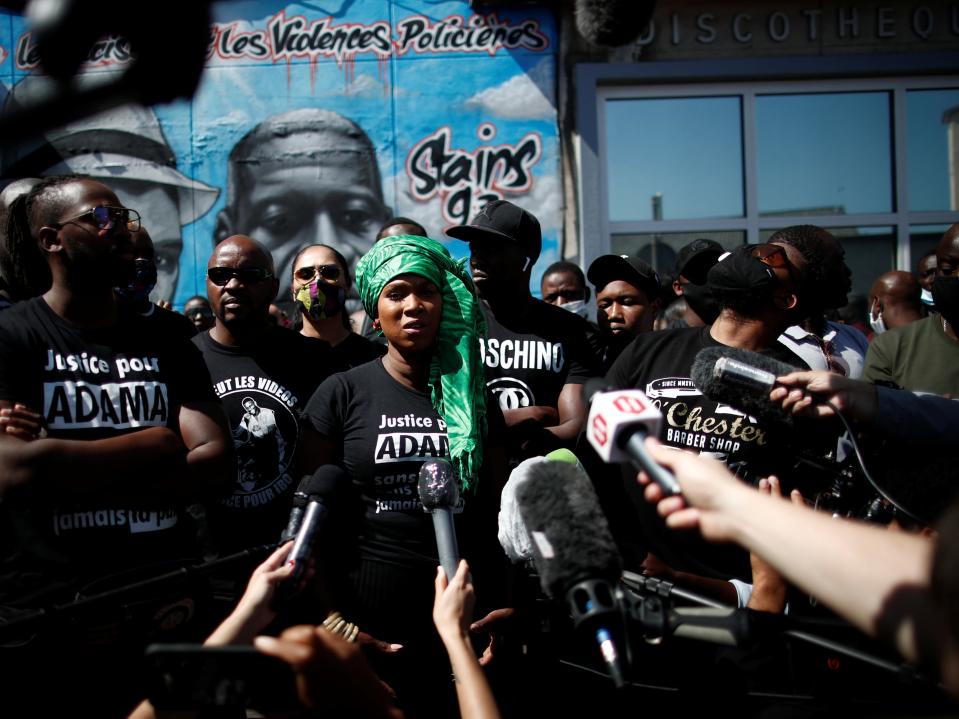Reporter arrested covering George Floyd protests speaks out while facing charges

Journalists listen to Assa Traore, sister of Adama Traore, a 24-year-old Black Frenchman who died in a 2016 police operation.
(REUTERS)A soft red glow covered Andrea Sahouri as she managed to swipe through her phone to record a video from the backseat of a police car in Des Moines, Iowa, her hands zip-tied behind her back.
The effects of the pepper spray that had just been shot in her face moments earlier could still be heard in her voice in the video she posted to Twitter.
“Police deliberately took me, sprayed pepper spray on my face and then put me in zip ties,” Sahouri said in the video, adding: “I’m just doing my job as a journalist. I’m just out here reporting as I see.”
Sahouri was covering a protest in late May for the Des Moines Register, where she worked as a reporter covering crime and police, when the demonstration at Merle Hay Mall descended into violence. In a recent interview with The Independent, she recalled officers taking her aside and arresting her – despite her clearly identifying herself as a journalist to them beforehand.
“I just couldn’t believe what was happening,” she said. “I just kept proceeding to say I was press through the whole arrest.”
— Andrea May Sahouri (@andreamsahouri) June 1, 2020
That night, Sahouri became one of at least 57 journalists arrested nationwide amid protests sparked by the death of George Floyd, an unarmed, 46-year-old Black man killed in Minneapolis after an officer was seen on video kneeling on his neck while he pleaded for his life.
As police officers deployed tear gas, Sahouri began running from the area with her former boyfriend, who was visiting her when the protests erupted, as well as other journalists – including one from the Des Moines Register, who confirmed her account of the events and provided the same details in a conversation with editors immediately following her arrest. That journalist was not arrested.
After rounding the corner past the Verizon Wireless store in a plaza across the street from the mall, Sahouri slowed down briefly, when she said she noticed an officer charging at her.
“I put up my hands and said I was press multiple times, and he just didn’t seem to care, and proceeded to pepper spray me in the face, zip tie me and arrest me,” she said. “I kept proceeding to say I was press throughout the entire arrest … The police department knows me. I report on crime. I talk to the department almost every day at my job.”
At least 50 of the journalists arrested throughout the summer of protests have since had their charges dropped, according to US Press Freedom Tracker, includingThe Independent’s US Correspondent Andrew Buncombe, who was arrested while covering demonstrations in Seattle in early July when he said he showed an officer his State Department-issued press badge after being asked to leave the area.
He was then detained for over six hours and charged with “failure to disperse” before the charges were eventually dropped.
International human rights groups, as well as the Committee to Protect Journalists and scores of national media outlets have brought attention to Sahouri’s case, while calls for her charges to be dropped have grown ahead of her trial, currently scheduled for 8 March. A petition demanding authorities drop all charges against Sahouri has been signed by more than 250 faculty and staff at Columbia University’s Graduate School of Journalism, where Sahouri is an alum.
The Iowa Freedom of Information Council said “there was no legitimate reason for the Polk County Attorney’s Office to proceed with these criminal charges” in a letter to the county attorney after Sahouri’s supervisors at the Des Moines Register confirmed she was on assignment covering the protests on the night of her arrest.
And yet the Polk County Attorney’s Office in Iowa has continued to seek Sahouri’s prosecution, charging her with “failure to disperse” and “interference with official acts”.
The looming trial and pending charges have been emotionally taxing for Sahouri, she said, but they haven’t prevented her from continuing to cover local police issues.

Editorial: Journalism is not a crime – protecting a free press is vital for us all
“It’s stressful, but from day one I’ve said that I’m not letting anyone or anything stop me from doing my job, she said, adding: “I’m happy to fight this fight. I think a free press is so important, not just in the United States but everywhere. People need to realise the persecution of journalists threatens democracy.”
In some ways, the arrest may have actually inspired Sahouri to further explore criminal justice issues in Iowa. She stayed on the crime beat and recently published a two-part investigation into the secrecy of local police complaints.
“I had a conversation with my editors where I said, ‘I want to keep doing this work,’” Sahouri recalled from the days after her arrest. “They said, ‘Right on.’”
“I don’t think it’s going to end with me,” she added. “But I do hope my case sheds some light on the importance of journalism. I hope this sets a precedent to stop persecuting journalists.”
Sahouri’s trial has been scheduled for 8 March and will take place in front of first-year students at Drake University Law School as part of a trial practicum program, in which law students are offered an opportunity to observe all aspects of certain cases for education purposes.
Read More
Journalism is not a crime – protecting a free press is vital for us all

 money
money 